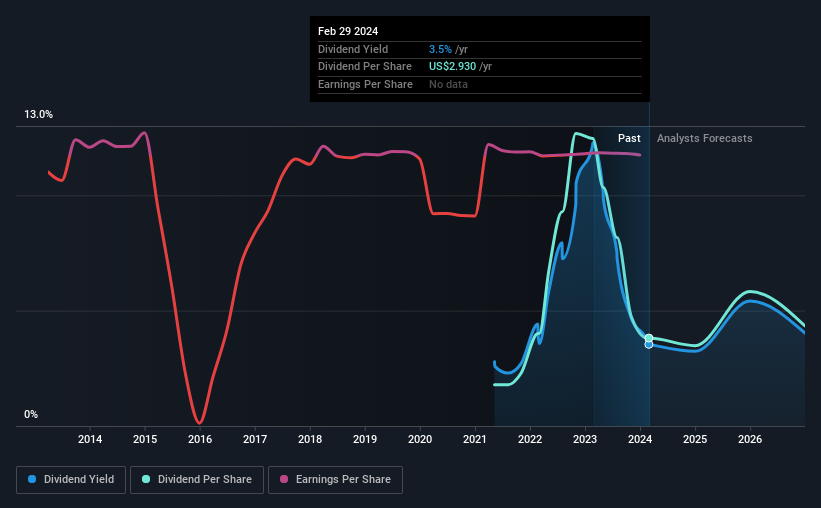Chesapeake Energy Corporation (NASDAQ:CHK) Is About To Go Ex-Dividend, And It Pays A 3.5% Yield
Chesapeake Energy Corporation (NASDAQ:CHK) stock is about to trade ex-dividend in four days. The ex-dividend date occurs one day before the record date which is the day on which shareholders need to be on the company's books in order to receive a dividend. The ex-dividend date is important as the process of settlement involves two full business days. So if you miss that date, you would not show up on the company's books on the record date. Accordingly, Chesapeake Energy investors that purchase the stock on or after the 6th of March will not receive the dividend, which will be paid on the 26th of March.
The company's next dividend payment will be US$0.575 per share, on the back of last year when the company paid a total of US$2.93 to shareholders. Calculating the last year's worth of payments shows that Chesapeake Energy has a trailing yield of 3.5% on the current share price of US$82.78. Dividends are a major contributor to investment returns for long term holders, but only if the dividend continues to be paid. That's why we should always check whether the dividend payments appear sustainable, and if the company is growing.
View our latest analysis for Chesapeake Energy
Dividends are usually paid out of company profits, so if a company pays out more than it earned then its dividend is usually at greater risk of being cut. Chesapeake Energy paid out just 20% of its profit last year, which we think is conservatively low and leaves plenty of margin for unexpected circumstances. A useful secondary check can be to evaluate whether Chesapeake Energy generated enough free cash flow to afford its dividend. It paid out 88% of its free cash flow as dividends, which is within usual limits but will limit the company's ability to lift the dividend if there's no growth.
It's positive to see that Chesapeake Energy's dividend is covered by both profits and cash flow, since this is generally a sign that the dividend is sustainable, and a lower payout ratio usually suggests a greater margin of safety before the dividend gets cut.
Click here to see the company's payout ratio, plus analyst estimates of its future dividends.
Have Earnings And Dividends Been Growing?
Businesses with shrinking earnings are tricky from a dividend perspective. If earnings decline and the company is forced to cut its dividend, investors could watch the value of their investment go up in smoke. Readers will understand then, why we're concerned to see Chesapeake Energy's earnings per share have dropped 8.8% a year over the past five years. When earnings per share fall, the maximum amount of dividends that can be paid also falls.
Another key way to measure a company's dividend prospects is by measuring its historical rate of dividend growth. Chesapeake Energy has delivered an average of 29% per year annual increase in its dividend, based on the past three years of dividend payments.
The Bottom Line
Is Chesapeake Energy worth buying for its dividend? Its earnings per share have been declining meaningfully, although it is paying out less than half its income and more than half its cash flow as dividends. Neither payout ratio appears an immediate concern, but we're concerned about the earnings. Overall, it's not a bad combination, but we feel that there are likely more attractive dividend prospects out there.
However if you're still interested in Chesapeake Energy as a potential investment, you should definitely consider some of the risks involved with Chesapeake Energy. Every company has risks, and we've spotted 2 warning signs for Chesapeake Energy you should know about.
A common investing mistake is buying the first interesting stock you see. Here you can find a full list of high-yield dividend stocks.
Have feedback on this article? Concerned about the content? Get in touch with us directly. Alternatively, email editorial-team (at) simplywallst.com.
This article by Simply Wall St is general in nature. We provide commentary based on historical data and analyst forecasts only using an unbiased methodology and our articles are not intended to be financial advice. It does not constitute a recommendation to buy or sell any stock, and does not take account of your objectives, or your financial situation. We aim to bring you long-term focused analysis driven by fundamental data. Note that our analysis may not factor in the latest price-sensitive company announcements or qualitative material. Simply Wall St has no position in any stocks mentioned.

